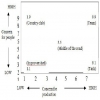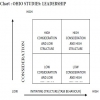Management Concepts & Organisational Behaviour - Organisational Power & Politics
Bases of Organisational Power
Posted On :
The coercive power depends on fear. The person with the coercive power has the ability to inflict punishment or adverse consequences on the other person.
Bases of
Organisational Power
The coercive power depends on fear. The person with the coercive power has the ability to inflict punishment or adverse consequences on the other person. One reacts to this power out of fear of the negative ramifications that might result from non-compliance. In the organisational context, managers frequently exercise coercive power as revealed from their actions such as dismissing, suspending or demoting their subordinates or withholding pay increases. In other words, managers control through force or hitting at the basic physiological or safety needs. Here it is to be noted that protective labour legislation and trade unions have stripped away some of this coercive power of managers.
Reward power is the opposite of coercive power. People comply with the wishes of another because it will result in positive benefits. The type of rewards includes material rewards like pay increase, fringe benefits, commissions, etc. Managers exercise this power since they have ability and resources to reward their subordinates. The strength of the reward power depends on whether the subordinates look at rewards offered to them as rewards or otherwise. Managers may offer what they think as rewards, but subordinates may not value them. The reverse may also be true.
This use of power rests on the allocation and manipulation of symbolic rewards. If a person can decide who is hired, control the allocation of resources, or influence group norms, he is said to have persuasive power. A few common symbols of manager’s power in the organisation include: getting a favorable placement for a talented subordinate, getting approvals for expenditures beyond budget, getting items on agenda at policy meetings, getting fast access to top decision makers, getting early information
about decisions and policy shifts, getting above-average salary increases for
subordinates, etc.
Knowledge or access to information is the final use or base of power. When an individual in a group or organisation controls unique information needed to make decisions, then he processes knowledge-based power.
So far our discussion has confirmed the unilateral influence of power from the agent (power holder) to targets (other persons). Power relationship as a reciprocal relationship can be better understood by focusing attention on characteristics of targets. Influenceability of targets depends on the following:
Power is a function of dependency. The general dependence postulates that the greater the dependency of the target on the agent, the greater the power the agent has over the target. Dependency increases when the resources controlled by the agent are important, scare and non-substitutable. The scarcity - dependency relationship can be clearly seen in occupational groups where supply of skills is low relative to demand for them.
When people have a feeling of uncertainty about the correctness of their behaviour, they are more susceptible to influence.
Persons with personality characters like low tolerance for ambiguity and high anxiety (fear of failure) are more likely to be influenced.
Relationship between intelligence and influenceability is complex. In some cases it is positive whereas in other cases negative, since highly intelligent people being held in high esteem may resist being influenced.
It is traditionally believed that women are more likely to be influenced than men, because of the way the former are brought up. As the role of women is fast changing and they are more empowered now, there is a perceptible change, of late.
Western cultures that emphasize individuality, dissent and diversity tend to decrease influenceability whereas Asian cultures that emphasize cohesiveness, agreement and uniformity promote influenceability.
Coercive Power
The coercive power depends on fear. The person with the coercive power has the ability to inflict punishment or adverse consequences on the other person. One reacts to this power out of fear of the negative ramifications that might result from non-compliance. In the organisational context, managers frequently exercise coercive power as revealed from their actions such as dismissing, suspending or demoting their subordinates or withholding pay increases. In other words, managers control through force or hitting at the basic physiological or safety needs. Here it is to be noted that protective labour legislation and trade unions have stripped away some of this coercive power of managers.
Reward Power
Reward power is the opposite of coercive power. People comply with the wishes of another because it will result in positive benefits. The type of rewards includes material rewards like pay increase, fringe benefits, commissions, etc. Managers exercise this power since they have ability and resources to reward their subordinates. The strength of the reward power depends on whether the subordinates look at rewards offered to them as rewards or otherwise. Managers may offer what they think as rewards, but subordinates may not value them. The reverse may also be true.
Persuasive Power
This use of power rests on the allocation and manipulation of symbolic rewards. If a person can decide who is hired, control the allocation of resources, or influence group norms, he is said to have persuasive power. A few common symbols of manager’s power in the organisation include: getting a favorable placement for a talented subordinate, getting approvals for expenditures beyond budget, getting items on agenda at policy meetings, getting fast access
Knowledge Power
Knowledge or access to information is the final use or base of power. When an individual in a group or organisation controls unique information needed to make decisions, then he processes knowledge-based power.
Influenceability of Targets of Power
So far our discussion has confirmed the unilateral influence of power from the agent (power holder) to targets (other persons). Power relationship as a reciprocal relationship can be better understood by focusing attention on characteristics of targets. Influenceability of targets depends on the following:
Dependency
Power is a function of dependency. The general dependence postulates that the greater the dependency of the target on the agent, the greater the power the agent has over the target. Dependency increases when the resources controlled by the agent are important, scare and non-substitutable. The scarcity - dependency relationship can be clearly seen in occupational groups where supply of skills is low relative to demand for them.
Uncertainty
When people have a feeling of uncertainty about the correctness of their behaviour, they are more susceptible to influence.
Personality
Persons with personality characters like low tolerance for ambiguity and high anxiety (fear of failure) are more likely to be influenced.
Intelligence
Relationship between intelligence and influenceability is complex. In some cases it is positive whereas in other cases negative, since highly intelligent people being held in high esteem may resist being influenced.
Gender
It is traditionally believed that women are more likely to be influenced than men, because of the way the former are brought up. As the role of women is fast changing and they are more empowered now, there is a perceptible change, of late.
Culture
Western cultures that emphasize individuality, dissent and diversity tend to decrease influenceability whereas Asian cultures that emphasize cohesiveness, agreement and uniformity promote influenceability.
Tags : Management Concepts & Organisational Behaviour - Organisational Power & Politics
Last 30 days 812 views














